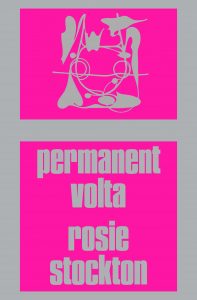
[Nightboat Books; 2021]
I first spent time with Rosie Stockton in late 2016 at Ditto Ditto Books, a small independent bookstore operated by the publisher and poet Maia Asshaq in Detroit. Rob Halpern was reading that night and had introduced me to Rosie a few weeks earlier, who was already a student in the graduate program I would soon be attending. The night was consequential. After Rob had wrapped up reading, I met the person I would call my partner for the next three years, Katie Nowinski, at the wine table set up in the back, next to bookshelves that reached the ceiling. In the years that followed, Rosie, Katie, and myself, as well as Rosie’s dog Bishop, lived together at Rob’s house in Ypsilanti while he was on sabbatical. It was there in that tiny house on Garland Street that the poems which now comprise Permanent Volta were first conceived. 2017 feels so far off now, but Rosie’s poems persist as little gifts of friendship and care in the present.
To desire beyond current conditions: that is what Rosie’s poems ask of their reader. For Stockton, this means to desire radically and queerly — what they describe as “to think you were in me/in my systems.” That said, Stockton, the good materialist they are, is no utopian. The poems in this collection draw attention to both their conditions of production — Blue Apron, the Amazon locker — and bend toward a future not yet realized, one far more humane, habitable, and sexy. Stockton is interested in creating conditions through formal constraint for the poems to desire beyond the sovereign; that is, beyond the self, the liberal individual, and the nation-state, all of which bear traces of the triangular slave trade and global capitalism. The poems perform a dialectical grappling with past, present, and imagined futures.
Marx writes in The Eighteenth Brumaire of Louis Bonaparte that we make our own history “under circumstances existing already, given and transmitted from the past.”For Stockton, this point is a crucial aspect of why a poet might grapple with tradition, if only to deal with very real and threatening material conditions of poetic production, always rooted in a historical political-economic context. The forms of social life, such as bourgeois romantic love, that the sonnet once attempted to respond to and conjure continue to live past their expiration, figures haunting us in a present in which social change often feels insurmountable. Stockton’s poems ask of poetry — as a map of the world, a GPS of social relations — to alter our perception of the very relations which impede the inauguration of the new. As they write, “I needed a new set of relations.” The sonnet, no longer a song sung between a lover and singular love object, is transformed into anti-sonnet, a space of queer desire, a kinky space — what Stockton describes as “a bad sub, or a libidinal nobody.” Here, the impossible becomes possible, if only for a brief moment in the intimate space of a poem.
Stockton draws upon Rimbaud’s turn of phrase from the Illuminations — “there is no sovereign music for our desire.” Rimbaud penned his poems during the social tumult and transformation following the events of the Paris Commune. Stockton translates their meaning for us in the 21st century into a rallying call for social transformation and the transformation of subjectivity that might follow. The genius of Permanent Volta is that Stockton — a poet par excellence — enacts this departure from bourgeois individualism at the level of both content and poetic form.Throughout Permanent Volta, Stockton turns traditional poetic forms such as the sonnet and the sestina on their head, in the interest of inventing what Rimbaud calls a “new music for our desire.” Stockton’s sonnets are fragmented and out of joint, taking on new shapes and forms. Stockton pays keen attention to the “grammars of silence,” as they write, while always remaining in fraught conversation with form itself. This is reflected when Stockton writes, “you can write a sestina, I demand, you can really write a sestina.” In “Sovereign Exhaustion,” Stockton writes through and rewrites Rimbaud’s “Tale” by writing, “we lack the form to want each other rightly,” drawing attention both to the inadequacies of poetic form and current forms of love and desire. Stockton’s poems ask: how can we articulate a new love, one which disobeys the borders of self and nation? How are we to love under current conditions? The poems strive toward the realization of communal forms — reflected in what Stockton calls “our collective and bombed organs” — a kind of love song not constrained by the normative expectations of heterosexual love and capitalistic desire-maps.
The affinity between Permanent Volta and the Illuminations runs deep in the work. Not only does Stockton perform English-to-English translations of Rimbaud’s “Tale” and “Childhood,” but both poets share an affinity and interest in a future far, far away from this one. In The Emergence of Social Space, Kristin Ross writes “the future is an indispensable dimension of Rimbaud’s poetic dialogue with time and history.” Ross also connects the breakdown of the social order during Paris in 1871 to formal innovations in Rimbaud’s poetics. Concerning the transformation of the singular “I” in Rimbaud’s poetry into a collective “we,” Ross writes that this abandonment of individualism is reflected at the level of form through the use of slang, neologism, and juxtaposition, all of which are deployed by Stockton throughout Permanent Volta. This playfulness with form is shown when Stockton writes, “be careful of that word, of that order.”Parataxis, or the “de-hierarchization of the sentence,” as Rosie put it over the phone one afternoon, is deployed throughout the work as well, giving the reader another instantiation of form modeling a future which it seeks to invent. Throughout the collection, Rosie privileges lexical incoherence in which the inarticulate is given space to sense a world which is still unknown to us, and where dominant sense-making is turned on its head. “We must prepare to resist speaking,” the poet writes.
Leon Trotsky writes in the “Manifesto for an Independent and Revolutionary Art” (also penned by Diego Rivera and Andre Breton) that “true art” aspires to “a complete and radical reconstruction of society.” Permanent Volta is, of course, a play on Trotsky’s notion of permanent revolution — the idea that a successful transformation of society into communism can only take place after a prolonged series of internationalist socialist revolutions. Stockton’s anti-sonnets break the trauma spell of capital’s backward dream and function as a kind of broken looking glass into the future. The sonnet is effectively on strike (as is the gendered labor of the muse Calliope, which Stockton calls an “angelic slut!”), working against both the tradition and historical conditions which bore the form. They refuse to resolve themselves with any easy couplets — “my broken volta aches out a turn,” as Stockton writes. Their voltas spin forward into history, renouncing all easy conclusions.
Stockton’s poems desire to love beyond borders and nations, beyond the partnered pair and the compulsory family unit, into spaces of deep pleasure, performativity, freedom, and kink. As Stockton writes, “i’ve been up all night/trying to figure out how to want/loud enough to tie myself up.” The question of how to want is pressured, interrogated, and blown open in the poems in Permanent Volta, in the interest of queering all that we think we know and reimagining the border between self and other, inside and outside, and stranger and friend. It was on Belle Isle, after all, an island park situated on the Detroit River — a river that “doubles as a border,” as Stockton writes— where Rosie and I read Rimbaud’s “Tale” aloud to each other, giving each other the prompt to translate what we had just heard.
The river, holding so much meaning in the poems for myself and Rosie, is a powerful figure for the concerns of the book. In the dead of Michigan winter, it is often hard to tell how far the water extends to the Canadian side, rendering any sense of horizon, as well as national border, opaque and dreamlike. Waterways, which often define borders, are at the same time — through erosion, the changing of current, natural disaster, and rising sea levels — the source of the border’s own annihilation. Stockton’s poems ask us to pay more attention to the water, the river, and the ice. Where are the cracks? Can we see to the other side? What do we imagine is on the other side of this horizon? How can we begin to see and live with more clarity? As we begin to ask these questions, we peel back the layers of false consciousness that have prevented us from truly seeing in the first place, and only then can we begin to dream. I invite you, dear reader, to dream with Stockton on the pages of Permanent Volta, if only to “hear the things/we cannot see,”in an effort to transform all our relations, so that “together we made/this place/together/we can leave it.”
Addy Malinowski is a poet and musician living in Hamtramck, MI. He teaches writing at Oakland University and their work can be found at Social Text, Inverted Syntax, The Poetry Project Newsletter, and Indolent Books.
This post may contain affiliate links.







